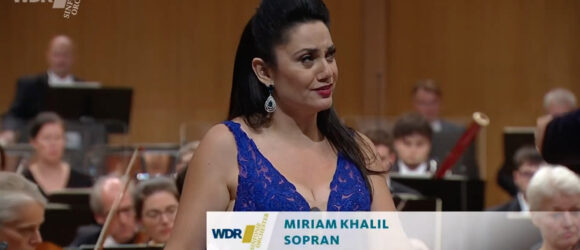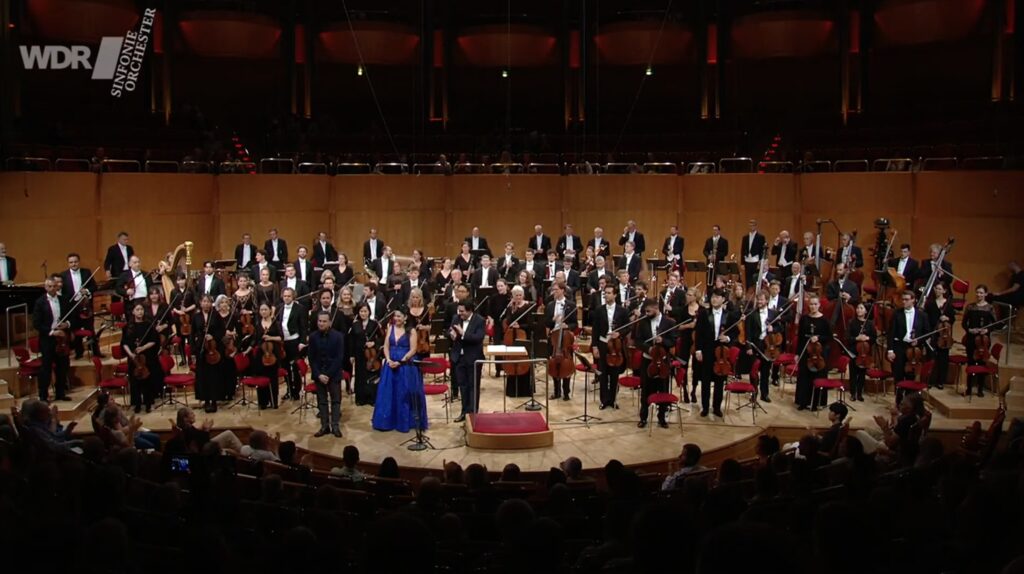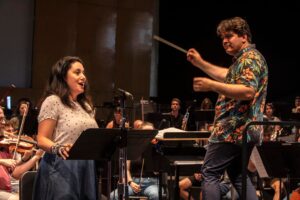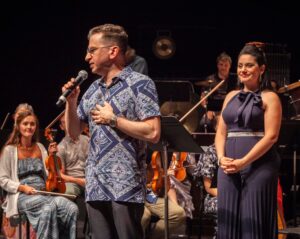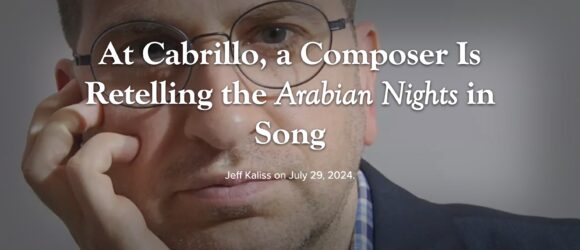Cinderella presented at Miller Outdoor Theater
- On October 20, 2024
- By alzand@rice.edu
- In Musiqa, News
 0
0
Musiqa had its debut at Houston’s iconic Miller Outdoor Theater, with a characteristic program of inter-arts works. The evening program included a presentation of Lotte Reiniger’s 1922 silent silhouette film, Cinderella, with live music, conducted by Yue Bao.
Al Hakawati Receives European Première
- On October 01, 2024
- By alzand@rice.edu
- In EVENTS, News, Reviews/Press
 0
0
Al Hakawati received its European premiere on September 22 at the Kölner Philharmonie, in a performance by soprano Miriam Khalil and the WDR Symphony Orchestra, under the direction of Cristian Măcelaru. Also on the program was Shostakovich’s Cello Concerto No.1 ( Sheku Kanneh-Mason), and Rimsky Korsakov’s Scheherazade, Op. 35. Al Hakawati is a co-commission of the Cabrillo Festival of Contemporary Music, WDR Sinfonieorchester Köln and the Orchestre National de France.
Al Hakawati (The Storyteller) presents fragments from an opera-in-progress entitled The Book of Tales. The opera is inspired by a recent discovery about a beloved story collection, the so-called “Arabian Nights.” The exact provenance of these medieval Arabic tales, properly known as Alf Laylah wa-Laylah [One Thousand and One Nights], has always been something of a mystery. That all changed in 1993 when a forgotten 18th century Arabic manuscript was found in the Vatican library. It was a travel memoir written by a 75-year-old Syrian storyteller named Hanna Diyab. In 1707, the young Diyab had embarked on an extraordinary, years-long journey to Europe. His incredible adventures culminated in a meeting with the Sun King, King Louis XIV, in the halls of Versailles. Diyab told his entrancing stories to everyone he met in his travels, including to Antoine Galland, a translator and archaeologist in Paris. It was Galland who, in 1710, first introduced Western readers to the stories of Ali Baba and Aladdin in Les Mille et une Nuits—though Galland makes no mention of the storyteller. Diyab returned to Syria in 1709 and eventually became a successful cloth merchant in Aleppo.
He seems to have had no idea how far his captivating stories had travelled.
The opera connects stories and storytellers across time and place: from the present day, to the Ancien Régime of France, to the imaginary world of Scheherazade. And, though the “frame story” is Diyab’s, the most significant characters in the story are women. The fragments in Al Hakawati comprise four “scenes” that feature the opera’s three principal female characters.
Al Hakawati Premiered at 2024 Cabrillo Festival of Contemporary Music
- On August 30, 2024
- By alzand@rice.edu
- In EVENTS, News
 0
0
Al Hakawati, a new work for soprano and orchestra received its premiere on August 2nd in Santa Cruz, CA at the 2024 Cabrillo Festival of Contemporary Music, with soprano Miriam Khalil and conductor Cristian Mӑcelaru. The work will be repeated on September 21 by the WDR Sinfonieorchester Köln in Germany. The work is a co-commission of Cabrillo, WDR and l’Orchestre National de France (who will do the work in 2026).
Al Hakawati (The Storyteller) presents fragments from an opera-in-progress entitled The Book of Tales. The opera is inspired by a recent discovery about a beloved story collection, the so-called “Arabian Nights.” The exact provenance of these medieval Arabic tales, properly known as Alf Laylah wa-Laylah [One Thousand and One Nights], has always been something of a mystery. That all changed in 1993 when a forgotten 18th century Arabic manuscript was found in the Vatican library. It was a travel memoir written by a 75-year-old Syrian storyteller named Hanna Diyab. In 1707, the young Diyab had embarked on an extraordinary, years-long journey to Europe. His incredible adventures culminated in a meeting with the Sun King, King Louis XIV, in the halls of Versailles. Diyab told his entrancing stories to everyone he met in his travels, including to Antoine Galland, a translator and archaeologist in Paris. It was Galland who, in 1710, first introduced Western readers to the stories of Ali Baba and Aladdin in Les Mille et une Nuits—though Galland makes no mention of the storyteller. Diyab returned to Syria in 1709 and eventually became a successful cloth merchant in Aleppo.He seems to have had no idea how far his captivating stories had travelled.
The opera connects stories and storytellers across time and place: from the present day, to the Ancien Régime of France, to the imaginary world of Scheherazade. And, though the “frame story” is Diyab’s, the most significant characters in the story are women. The fragments in Al Hakawati comprise four “scenes” that feature the opera’s three principal female characters.
2024 Barlow Prize
- On August 30, 2024
- By alzand@rice.edu
- In News, Reviews/Press
 0
0
 The Barlow Endowment for Music Composition at Brigham Young University proudly announces the Barlow Prize recipient for 2024.
The Barlow Endowment for Music Composition at Brigham Young University proudly announces the Barlow Prize recipient for 2024.
After reviewing 384 submissions from 47 countries, the judging panel awarded Karim Al-Zand the $15,000 Barlow Prize to compose a major new work for organ, to be premiered by a consortium of performers which will include Chelsea Chen,  Don Cook, Janette Fishell, and Bradley Hunter Welch.
Don Cook, Janette Fishell, and Bradley Hunter Welch.
Known for his “strong and startlingly lovely” music (Boston Globe), Canadian-American composer Karim Al-Zand’s compositions span a wide range of influences and inspirations. His diverse portfolio includes solo, chamber, vocal, and orchestral works that draw from a rich tapestry of sources such as graphic art, myths, world folk music, and his Middle Eastern heritage. With accolades including the ArtSong Prize and the Arts and Letters Award in Music, Al-Zand’s innovative compositions continue to leave a significant mark internationally. A founding member of Musiqa, Houston’s premier contemporary music group, Al-Zand is a Professor of Composition and Theory at Rice University’s Shepherd School of Music.
Al Hakawati preview
- On August 05, 2024
- By alzand@rice.edu
- In EVENTS, News, Uncategorized
 0
0
I recently spoke to Jeff Kaliss of The San Francisco Classical Voice about the premiere performance of Al Hakawati at the Cabrillo Festival of Contemporary Music.



